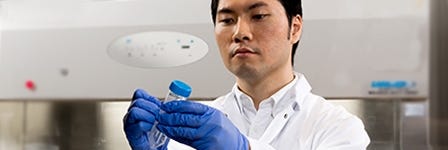Reducing Platelet Contamination in Blood Samples
Platelets (thrombocytes), cell fragments derived from megakaryocytes, are used in normal blood clotting, and must be handled gently to prevent activation
Platelets (thrombocytes) are small, irregularly shaped clear cell fragments derived from megakaryocytes and are necessary for normal blood clotting. Platelets, by nature, are very sticky, and when activated, will adhere easily to other sticky cell types (i.e. monocytes, eosinophils, etc.), creating cell clumps.
Follow these tips to reduce platelet contamination and prevent platelet activation in your blood samples.
Recommendations for Blood Sample Collection
Samples containing platelets should be collected and handled gently to prevent platelet activation. The following recommendations1 may help:
- When drawing blood, use a wide bore needle (e.g. 19G), and do not apply vigorous traction if using a syringe plunger.
- Use anticoagulants when drawing blood (e.g. collect the blood in acid citrate dextrose (ACD) tubes).
- Do not vortex the blood sample.
- Use buffer without Ca++ and Mg++ to prevent platelet activation.
Preparation of Mononuclear Cell Suspensions
The following recommendations may help reduce platelet contamination in mononuclear cell suspensions prepared from fresh whole blood:
- When isolating mononuclear cells during density gradient centrifugation (e.g. using Lymphoprep™ or Ficoll™ as the density medium), first pipette off the upper, platelet-rich plasma layer as much as possible without disturbing the PBMC layer.
- To wash the isolated mononuclear cells:
- Perform a slow spin on the isolated cells (120 x g, 10 min, brake off, room temperature).
- Ensure the centrifuge swinging-buckets and the tubes inside are perfectly balanced. Since this is a low g-force spin, even small imbalances may dislodge the pellet.
- Carefully remove the platelet-rich supernatant and discard.
- Using a fresh pipette, gently resuspend the cell pellet in D-PBS with 2% FBS.
- Repeat at least twice for a total of 3 or more washes.
For a visual guide of the recommendations above, please see this video: How to Remove Platelets from Human Blood Samples Prior to Cell Separation
See protocol for isolating mononuclear cells from whole blood by density gradient centrifugation >
Isolation of PBMCs Using Magnetic Cell Separation
The standard procedure for the isolation of peripheral blood mononuclear cells (PBMCs) using density gradient centrifugation does not remove platelets. Researchers can perform additional washing steps in order to remove platelets following density gradient centrifugation. Alternatively, researchers can use the EasySep™ Direct Human PBMC Isolation Kit, which immunomagnetically depletes platelets during PBMC isolation.
EasySep™ Cell Isolation Starting Guide: Tips & Tricks
Learn about EasySep™ and discover key considerations that will help you avoid the most commonly made mistakes and ensure optimal cell isolation.
Isolating Target Cells Using Magnetic Cell Separation
STEMCELL Technologies also provides a platelet removal cocktail (Catalog# 19369C) to further deplete platelets during cell isolation using the EasySep™ Isolation or Enrichment kits. For more information on this product or to discuss compatibility with your cell isolation system, please contact techsupport@stemcell.com.
Related Resources
How to Reduce Cell Clumping in Single Cell Suspensions
This protocol describes how to reduce cell clumping in single cell suspensions by treating your sample with DNase I.
Isolate Cells from Blood
A detailed overview of methods to isolate different cell populations from blood samples.
Blood Sample Preparation E-Book
Learn about different techniques and protocols for processing blood samples to help you choose the right method for your application.
Efficient Blood Sample Processing
Browse our collection of tips and tools for red blood cell depletion and cell isolation from blood samples.
Reference
- Lim, K. G. and Weller, P. F. 2001. Isolation of Human Eosinophils. Current Protocols in Immunology. 7.31.1-7.31.7.
Request Pricing
Thank you for your interest in this product. Please provide us with your contact information and your local representative will contact you with a customized quote. Where appropriate, they can also assist you with a(n):
Estimated delivery time for your area
Product sample or exclusive offer
In-lab demonstration







